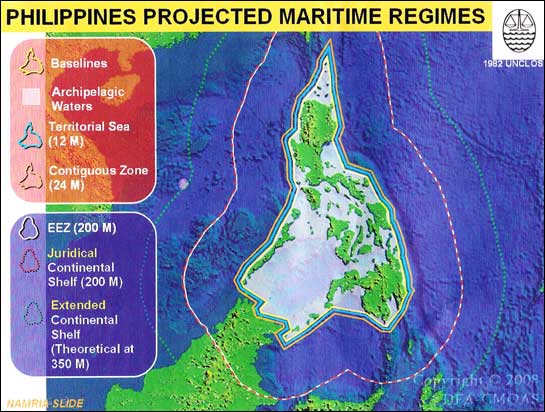In various conferences of the United Nations on the Law of the Sea, the Philippines and other archipelago states proposed that an archipelagic state composed of groups of islands forming a state is a single unit, with the islands and the waters within the baselines as internal waters.By this concept (archipelagic doctrine), an archipelago shall be regarded as a single unit, so that the waters around, between, and connecting the islands of the archipelago, irrespective of their breadth and dimensions, form part of the internal waters of the state, subject to its exclusive sovereignty.
Despite the opposition of maritime powers, the Philippines and four other states (Indonesia, Papua New Guinea, Fiji and Bahamas) got the approval in the UN Convention on the Law of the Sea held in Jamaica last December 10, 1982. They were qualified as archipelagic states. The archipelagic doctrine is now incorporated in Chapter IV of the said convention. It legalizes the unity of land, water and people into a single entity
photo courtesy of gmanews.tv
The Philippines bolstered the archipelagic principle in defining its territory when it included in Article 1 of the 1987 Constitution the following:
:
"The national territory comprises the Philippine Archipelago, with all the islands and waters embraced therein xxx"; and
"The waters around, between and connecting the islands of the archipelago, regardless of their dimensions, form part of the internal waters of the Philippines."
The archipelagic principle however is subject to the following limitations:
a) respect for the right of the ship and other states to pass through the territorial as well as archipelagic waters
b) respect to right of innocent passage
c) respect for passage through archipelagic sea lanes subject to the promulgation by local authorities of pertinent rules and regulations.


Are you with the DFA now? Please help Sec del Rosario in navigating the diplomatic waters involving the Scarborough, Spratleys and the Paracels.
ReplyDeleteThe concept of archipelagic Principle of Philippine territory has been abandoned being succeeded by Principle of Regime of Island.Archipilagic principles excluded Kalayaan Islands and Scraborough Shoal, hence the the Regime of Islands which includes the two contested groups of islands.
ReplyDeleteThe projection of ¨archipilagic waters¨ is very much confusing being the same with ¨internal waters¨ where no innocent passage is allowed.
ReplyDeletethe archipelagic doctrine, despite the existence of the regime of island will further bolster and validate our territorial claim over those disputed islands. the existence of any principle notwithstanding cannot in any way jeopardize the definitive description of our country's existence. still no one can change the fact that the country is an archipelago which is synonymous with "group of islands" and such definition gives credence to our claim that the disputed islands are ours due to proximity to the mainland or island base, and further, that islands need not always be clustered and close to each other,, oftentimes they are cluttered and scattered. these properties cannot be readily 'ascertainable and true' nor present in countries or land mass which is not an archipelago. if the 12 nautical mile nor the 200 nautical mile eez rule won't favor us, neither would it favor the other claimants. those disputed islands are remote from their mainland base and may only be within their possession by conquest and not by effective occupation nor jurisdiction. and this is the main reason why we should not allow further moves and intrusion by these countries into our territorial waters.
ReplyDeleteyou are right. But the question is, are we ready to face the consequences of going into war against China? Personally, I really don't care what the future brings to me and to the rest of the country, because the fact is the repetition of history when the Philippines fought against colonial rules of Spain, Great Britain, and Japan, which they were all defeated by our long time colonial ally and superpower United States of America. I can accept the fact that most of us will die but not ceding our very own territories to a colonial superpower. We should die fighting for the Disputed Claims in the Philippine Sea.
ReplyDelete